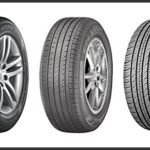All-weather tires are a better choice than all-season tires for cars in areas with harsh winters. All-season tires are more appropriate for temperate areas with mild winters.
Winter is one of the most challenging seasons in many parts of the world, and every driver’s priority is to have a car that is safe and stable enough to navigate the icy roads. While many car owners opt for all-season tires, it’s important to note that these may not be the most appropriate for areas with harsh winters.
The best option for these conditions is all-weather tires, which are designed to provide better traction and handling in snow and ice. All-season tires are better suited for temperate regions with milder winters, where the temperature rarely drops below freezing. To make an informed decision, it’s important to evaluate the weather conditions in your region and the specific needs of your car.

Credit: www.forbes.com
All Season Tires
If you’re in the market for new tires, you may have come across the term “all-season tires. ” but, what are they exactly, and are they the right choice for your car? In this section, we’ll explore the definition and characteristics of all-season tires as well as their pros and cons.
Definition And Characteristics
All-season tires are designed to provide reliable performance in a variety of weather conditions, including light snow, rain, and dry roads. They’re made with a unique rubber compound that allows for flexibility in a range of temperatures.
Some key characteristics of all-season tires include:
- Tread pattern: The tread on all-season tires is shallower than that of winter or off-road tires, allowing for improved handling on dry or wet surfaces.
- Durability: All-season tires tend to be more durable than winter tires and have a longer lifespan than summer tires.
- Noise: While all tires make some noise, all-season tires are designed to produce less road noise than other types of tires.
When And Where Should You Use Them?
All-season tires are a popular choice among drivers because of their versatility. Here are some situations where all-season tires may be the best choice:
- If you live in an area that experiences mild winters with occasional snow or ice, all-season tires can provide good traction in those conditions.
- If you want to avoid having to switch between winter and summer tires, all-season tires can be a convenient year-round option.
- If you don’t drive your car in extremely hot or cold temperatures, all-season tires can provide reliable performance.
Pros And Cons
As with any tire type, all-season tires have their advantages and disadvantages.
Pros:
- Versatility: All-season tires can handle a variety of weather conditions, making them a convenient option for year-round use.
- Durability: All-season tires tend to be more durable than winter tires and have a longer lifespan than summer tires.
- Cost-effective: Since they can be used year-round, all-season tires can be a cost-effective option compared to buying separate winter and summer tires.
Cons:
- Not ideal for extreme weather: While all-season tires can handle light snow and ice, they’re not recommended for areas with heavy winter conditions.
- Reduced performance: All-season tires may not offer the same level of performance as specialized summer or winter tires.
Maximum Speed And Conditions Of Use
It’s important to note that all-season tires have some limitations when it comes to speed and conditions of use.
- Maximum speed: All-season tires are typically rated for a maximum speed of around 130 mph.
- Conditions of use: All-season tires are designed for use on paved roads and are not suitable for off-road driving or extreme weather conditions.
All-season tires can be a great option for drivers looking for a tire that performs well in a variety of conditions. While they may not be the best choice for extreme winters or high-performance driving, they offer convenience, durability, and versatility at an affordable price point.
All Weather Tires
All-weather tires are versatile tires designed to provide performance in both hot and cold weather conditions, including dry, wet, and light winter snow. They offer improved traction, handling, and ride comfort throughout the year, making them an excellent choice for drivers who may encounter different weather conditions.
Definition And Characteristics
All-weather tires are designed to provide satisfactory performance in both hot and cold weather conditions. They offer improved handling, comfort, and drivability year-round. These tires have a unique tread pattern that allows them to evacuate water, delivering improved wet traction.
Additionally, they provide a smooth and quiet ride with enhanced durability, making them popular among drivers.
When And Where Should You Use Them?
All-weather tires are perfect for drivers who experience different weather conditions throughout the year. These tires work great in hot and cold climates, wet weather, and light snow, providing solid handling and good traction. They are suitable for drivers who don’t wish to switch between summer and winter tires in different seasons.
They are also an excellent choice for drivers who live in regions with mild winter conditions, such as california and the southern states, where temperatures can drop below freezing.
Pros And Cons
Pros:
- All-weather tires are suitable for all weather conditions, making them a versatile and practical choice for drivers who face different weather conditions throughout the year.
- They are a good alternative for drivers who don’t have access to storage for two sets of tires or don’t want the tire-changing hassle.
- All-weather tires offer a comfortable, quiet ride, with improved durability and longer lifespan.
Cons:
- All-weather tires are not suitable for severe winter conditions and heavy snowfall.
- These tires have a shorter lifespan than specialized summer and winter tires, which can affect the car’s overall performance and fuel efficiency.
- They may not provide optimal handling and performance for high-performance vehicles.
Maximum Speed And Conditions Of Use
All-weather tires come with a speed rating that indicates the maximum speed the tire can handle safely. The speed rating can range from n (87 mph) to y (186 mph). However, the maximum speed varies depending on the tire’s load rating, inflation pressure, and other factors.
Therefore, it is essential to check the tire’s speed rating table before using them under high-speed conditions.
All-weather tires are suitable for use in moderate weather conditions. They can handle mild winter conditions, such as light snow and freezing temperatures. However, drivers should avoid using all-weather tires in severe winter conditions and extensive snowfall, where specialized winter tires are recommended.
Comparison Between All Season And All Weather Tires
When it comes to choosing the best tires for your car, the options can become overwhelming. All season and all weather tires are two popular types that drivers often debate upon. To make an informed decision about which one is best for your vehicle, let’s compare how they differ in terms of design, performance, cost, maintenance, and overall suitability.
Differences In Design And Features
- All-season tires are designed for use in moderate weather conditions, including dry, wet, and light snow conditions. They typically have a symmetrical tread pattern and are made of a rubber compound that allows for good traction in both warm and cold weather.
- All-weather tires, on the other hand, are designed to function in all weather conditions, including snow and ice. They have a more aggressive tread pattern, which provides superior traction on slippery surfaces. Additionally, they’re marked with the three-peak mountain snowflake (3pmsf) symbol, indicating the ability to perform in severe snow conditions.
Differences In Performance On Different Types Of Roads And Weather Conditions
- All-season tires provide stable handling and reliable performance on dry and wet roads. However, they may not perform as well as all-weather tires on icy or snowy surfaces.
- All-weather tires perform well on cold and wet roads, and their added grip makes them more suitable for use on slippery surfaces like snow and ice compared to all-season tires.
Differences In Cost And Maintenance
- All-season tires are less expensive upfront compared to all-weather tires. However, they may not last as long, so you may need to replace them more often.
- All-weather tires are more expensive but last longer than all-season tires. Since they can be used year-round, you won’t need to pay to swap out your tires during the changing seasons.
Which One Wins Overall And For Specific Situations?
All-weather tires provide better performance in cold, snowy, and icy conditions, making them a better choice for those living in regions with harsh winters. They also have a longer lifespan, which can be more cost-effective in the long run. However, if you live in a region with mild weather conditions, all-season tires are a good choice.
Ultimately, the best choice for your car depends on your driving needs, driving conditions, and budget.
Factors To Consider When Choosing Between All Season And All Weather Tires
Tire all season or all weather: which is best for your car?
Choosing the right tires for your car can be a daunting task, but it is essential for your vehicle’s performance, safety, and fuel economy. All season and all-weather tires are popular options for drivers who live in areas with changing weather conditions.
So, which one should you choose? We have compiled a list of factors to consider when deciding between all-season and all-weather tires.
Climate And Weather Conditions
The climate and weather conditions in your area play a significant role in deciding between all-season and all-weather tires. All season tires are designed to handle a wide range of temperature and weather conditions, from hot summers to mild winters.
On the other hand, all-weather tires are engineered to provide superior grip and handling in severe winter conditions. Some key points to consider are:
- If you live in an area with mild winters and occasional snow, all-season tires may be the right choice for you.
- If you live in an area with severe winters and heavy snowfall, all-weather tires are the best choice.
Driving Habits And Style
Your driving habits and driving style also influence the choice between all-season and all-weather tires. Some key points to consider are:
- If you drive frequently on highways and have a smooth driving style, all-season tires are a better option as they provide a comfortable ride and good braking performance on dry and wet roads.
- If you have an aggressive driving style, all-weather tires offer superior traction and handling in slippery conditions.
Road Types And Conditions
The type of roads you regularly travel on and the driving conditions you encounter will also impact the tire choice. Some key points to consider are:
- If you mostly drive on well-maintained roads, all-season tires are suitable as they provide a comfortable ride and good handling on dry and wet roads.
- If you frequently travel on poorly maintained, icy or snow-covered roads, all-weather tires are better as they provide superior grip and handling in severe winter conditions.
Car Make And Model
The make and model of your car can also impact the tire choice. Consult with your car manufacturer’s guidelines and consider the following key points:
- Some car models require specific tire sizes and types, and they may require you to use all-season or all-weather tires exclusively.
- All-season and all-weather tires have different load capacity and speed rating, which directly affects their compatibility with your car.
Budget And Affordability
Lastly, budget and affordability play a role in deciding between all-season and all-weather tires. Some key points to consider are:
- All-season tires are generally more affordable than all-weather tires.
- However, all-weather tires offer more value for money as they can replace both summer and winter tires.
Deciding between all-season and all-weather tires largely depends on your driving needs, road conditions, climate, and budget. Consider these factors before making a choice and consult with a professional for expert advice.
Frequently Asked Questions Of Tire All Season Vs All Weather For Car
What’S The Difference Between All-Season And All-Weather Tires?
All-season tires are designed for low to moderate winter conditions, whereas all-weather tires perform better in severe winter weather and rainy conditions.
Which One Is Better – All-Season Or All-Weather Tires?
It depends on the driving conditions and regions where you drive. All-weather tires are better suited for snowy and icy roads, while all-season tires are best suited for moderate weather conditions.
Can I Drive With All-Season Tires In Snow?
Yes, all-season tires can be driven in light snow conditions, but they are not recommended for severe winter conditions and heavy snowfall. In such cases, it’s better to switch to winter or all-weather tires.
What Should I Consider When Choosing Between All-Season And All-Weather Tires?
You should consider the climate and weather conditions in your area, the type of driving you do, and your budget. All-weather tires may be more expensive than all-season tires, but they provide better performance in winter weather conditions.
How Long Do All-Season And All-Weather Tires Last?
The lifespan of both types of tires depends on a variety of factors such as driving habits, road conditions, and quality of the tire. However, on average, both types of tires can last up to six years or 50,000 miles if maintained properly.
Conclusion
Ultimately, choosing between all-season and all-weather tires for your car comes down to your driving needs and the weather patterns in your area. All-season tires are a great option for drivers who experience mild winters and occasional rain. They are versatile and can provide a smooth and comfortable ride in a variety of conditions.
All-weather tires, on the other hand, are a better option for those who experience harsher winters and unpredictable weather. They are designed to provide better traction and handling in ice and snow while still delivering a comfortable ride in warmer weather.
It’s crucial to consider the driving conditions you will face and choose the right tire for your needs. Remember, safety should always be your top priority, and investing in the right tires can make all the difference in your driving experience.

Tamim Hasan is an experienced content strategist and automotive enthusiast specializing in SEO driven car care guides and practical vehicle maintenance tutorials. His goal is to help everyday drivers understand their cars better and make smarter repair decisions.










